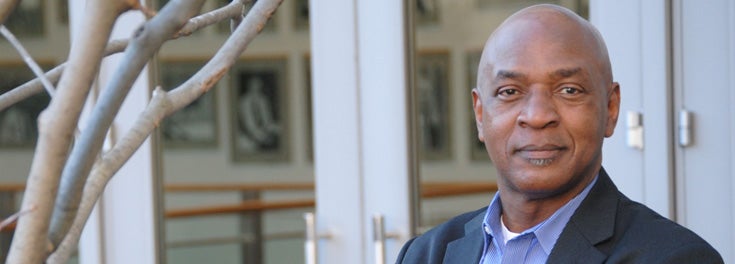
Cracking the books is one way to learn, but at URI we also bring in heavy hitters – in the flesh – to teach you a thing or two about the world.
One of those heavy hitters is Charles J. Ogletree (pictured above, courtesy of graduate student Clarissa Walker), one of the country’s leading African American intellectuals. He’s a nationally known Harvard law professor, an expert on criminal and civil rights legal issues, and a friend and mentor to President Barack Obama and First Lady Michelle Obama. He defended Anita Hill during the Senate confirmation hearings for Justice Clarence Thomas, and he was an attorney for Henry Louis Gates, Jr. when Gates was mistakenly arrested for breaking into his own house in Cambridge, Mass., three years ago.
We should all be honored; he’s a strong role model. This is a great night to acknowledge yourself, who you are, and know that you can achieve anything, if you put your mind to it. ~ Jennifer Christian, ’14.
Ogletree captivated an overflow crowd at URI’s Memorial Union ballroom for nearly two hours on February 5, 2013 as he talked, eloquently and passionately, about whether the country has made any progress ending racism. His short answer: yes, and we still have a long way to go. An African American president resides at 1600 Pennsylvania Avenue, but one million black men are in prison. Eric Holder is the country’s first African American U.S. attorney general, but millions of blacks live in poverty. “It’s time to celebrate,’’ said Ogletree. “But let’s not forget what we are experiencing today.’’
As a man who embodies URI’s spirit of big thinking, Ogletree was the perfect person to launch Black History Month, a month-long celebration honoring the contributions of African Americans. Check out our February calendar; it’s packed with events, including a performance of black American spirituals by a jazz guitarist, a reading of Alice Walker’s The Color Purple, and a talk called “Race, History and Education: Stand Up, Take a Seat, and Own Your Spot.’’
Ogletree was also the first speaker for URI’s new “Marlen Bodden Annual Lecture Series in Africana Studies,’’ which hosts speakers to discuss the African diaspora. Bodden is a New York-based civil rights lawyer and writer who endowed the lecture with a contribution. She’s also an expert on topics we care about at URI: human trafficking, human rights abuses, and modern day slavery.
It was a special evening for URI. “Professor Ogletree has captured the essence of Black History Month – celebrating our heritage,’’ said Vanessa Quainoo, director of Africana Studies.
With humor, old-fashioned storytelling, and a salute to the brave leaders of the civil rights movement, Ogletree told the crowd of mostly students and faculty he envisions a 21st century America that, in the words of former Supreme Court Justice Thurgood Marshall, is more of a “salad bowl’’ than a melting pot. That “bowl’’ is a mix of African Americans, whites, Latinos, Native Americans, Asians, gays and lesbians, and others – all celebrating their diversity while living in harmony. In an especially poignant moment, he also urged students to remember those past activists, grandmothers, college students, ministers and others who fought for social justice. “We have to lift as we climb,’’ Ogletree said. “I think about the great sacrifices that have been made by others who preceded us.’’
“We stand on the shoulders of others,’’ said Annie Russell, director of URI’s LGBTQ Center and an adjunct professor in gender and women’s studies. “For me, we have a responsibility to continue the fight – and he’s up for that.’’
Students came away inspired to dream big. “We should all be honored; he’s a strong role model,’’ said Jennifer Christian, ’14. “This is a great night to acknowledge yourself, who you are, and know that you can achieve anything, if you put your mind to it.’’
“He gave me the courage to feel like I can do anything – be a doctor, be a lawyer, be president,’’ said Erika Pires, ’15. “He was inspirational.’’
At URI we think it’s crucial in today’s world for students to learn about other cultures and people. That’s why we support a robust public speaking agenda – and that’s why we’re thrilled with Ogletree’s presence and the Bodden lecture series. The lectures reflect our commitment to a global education and embolden Africana Studies, a vibrant and expanding program that explores African and African American social, political, and historical developments. The classes are open to all students on campus, and rightly so. “The history of African Americans,’’ said Quainoo, “is the history of our country.’’
